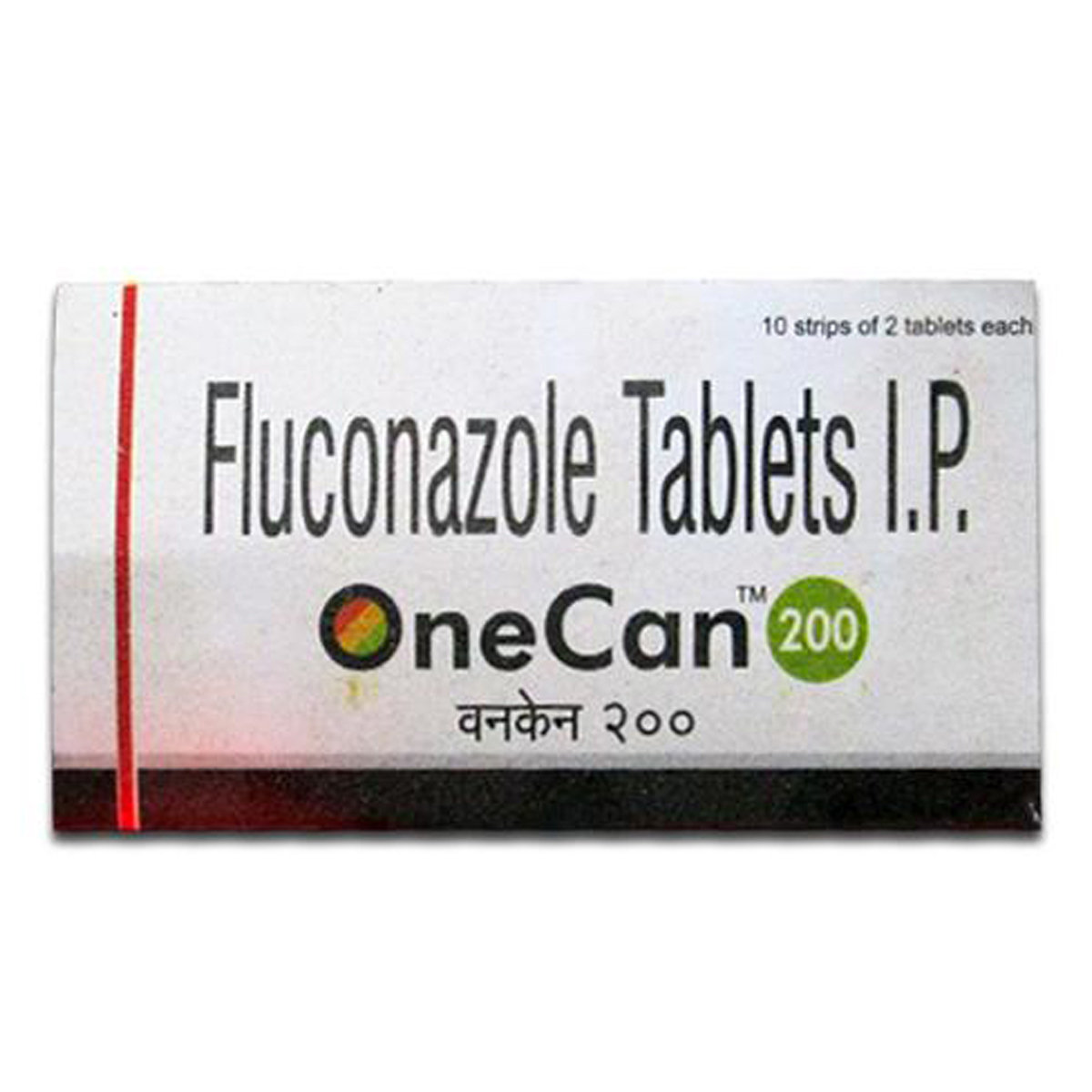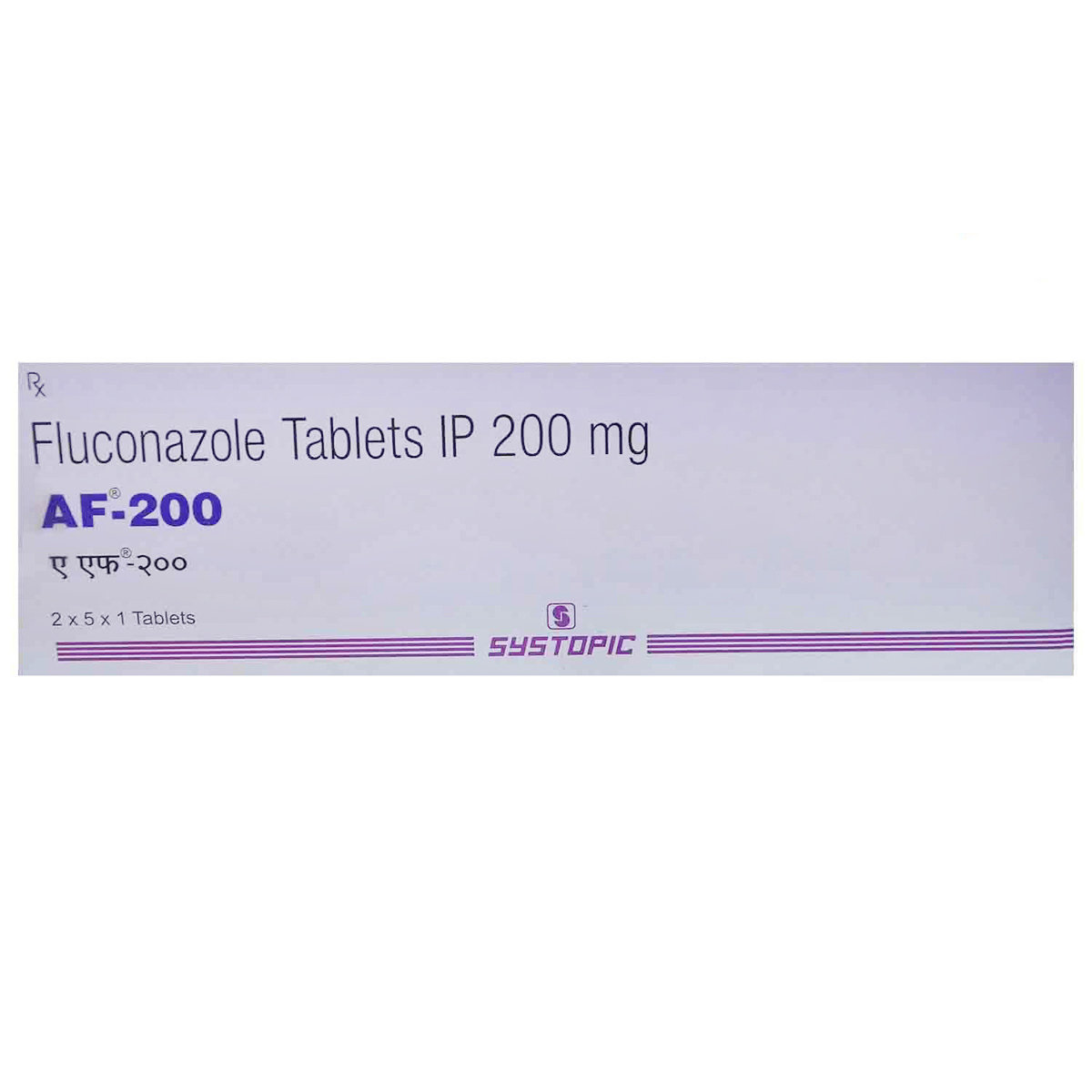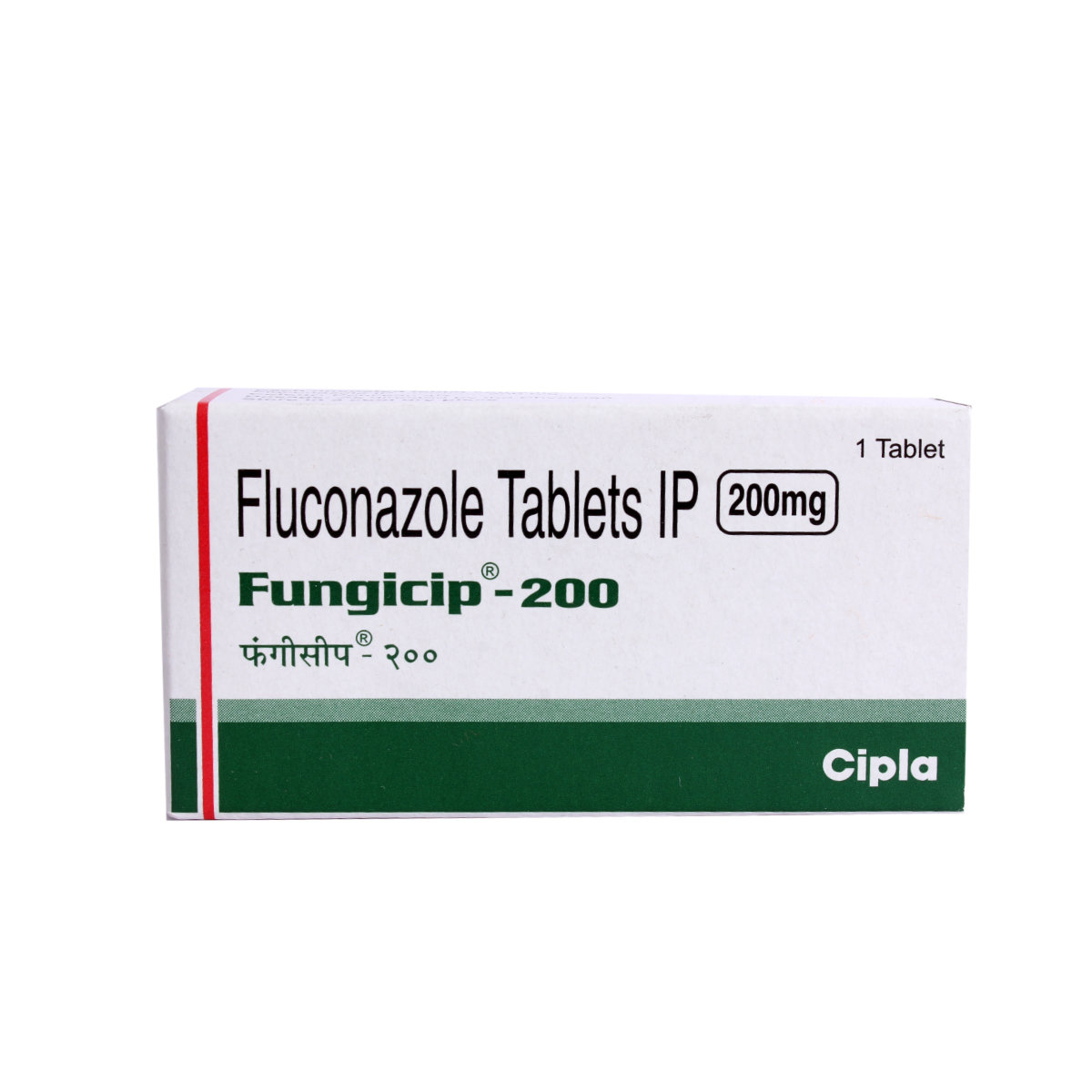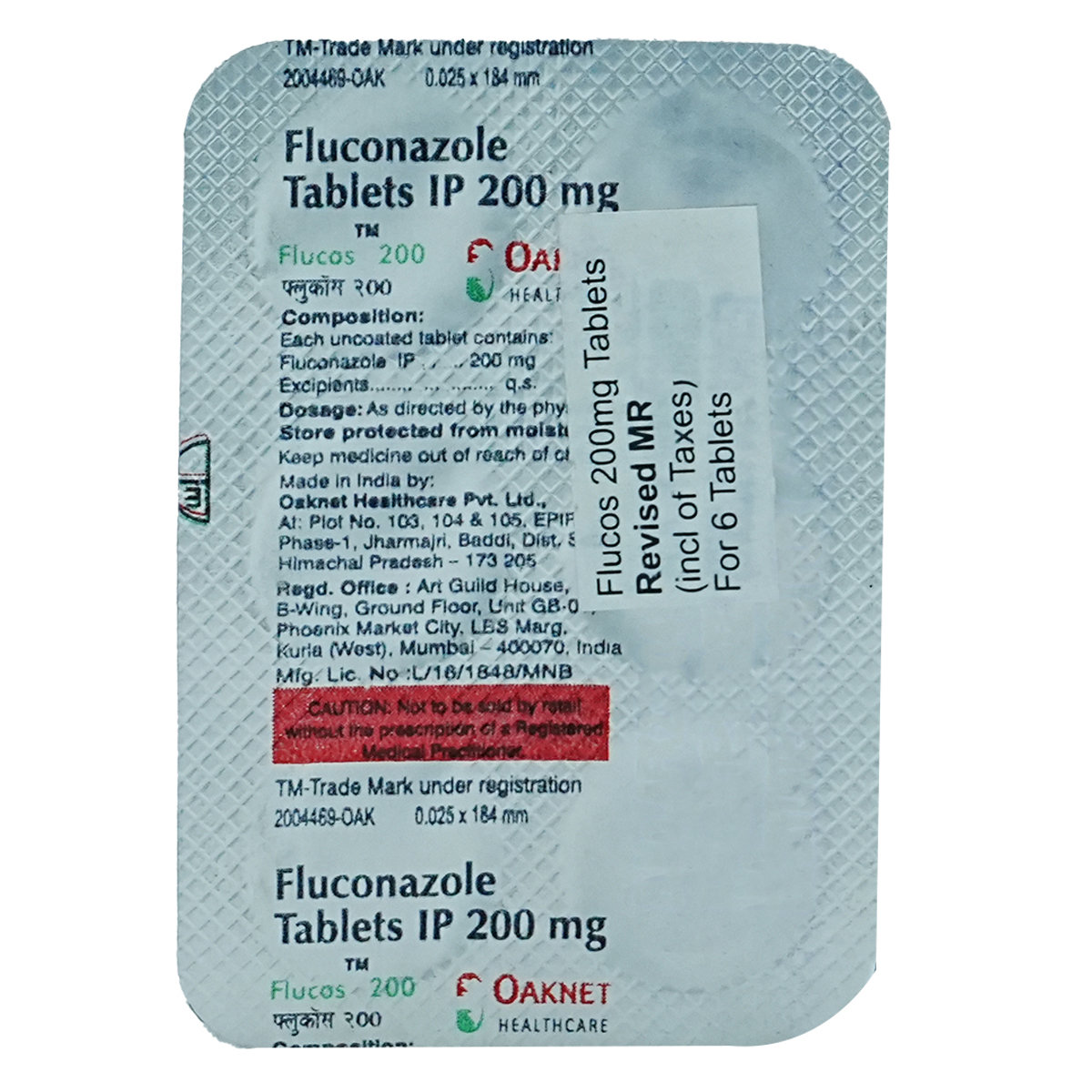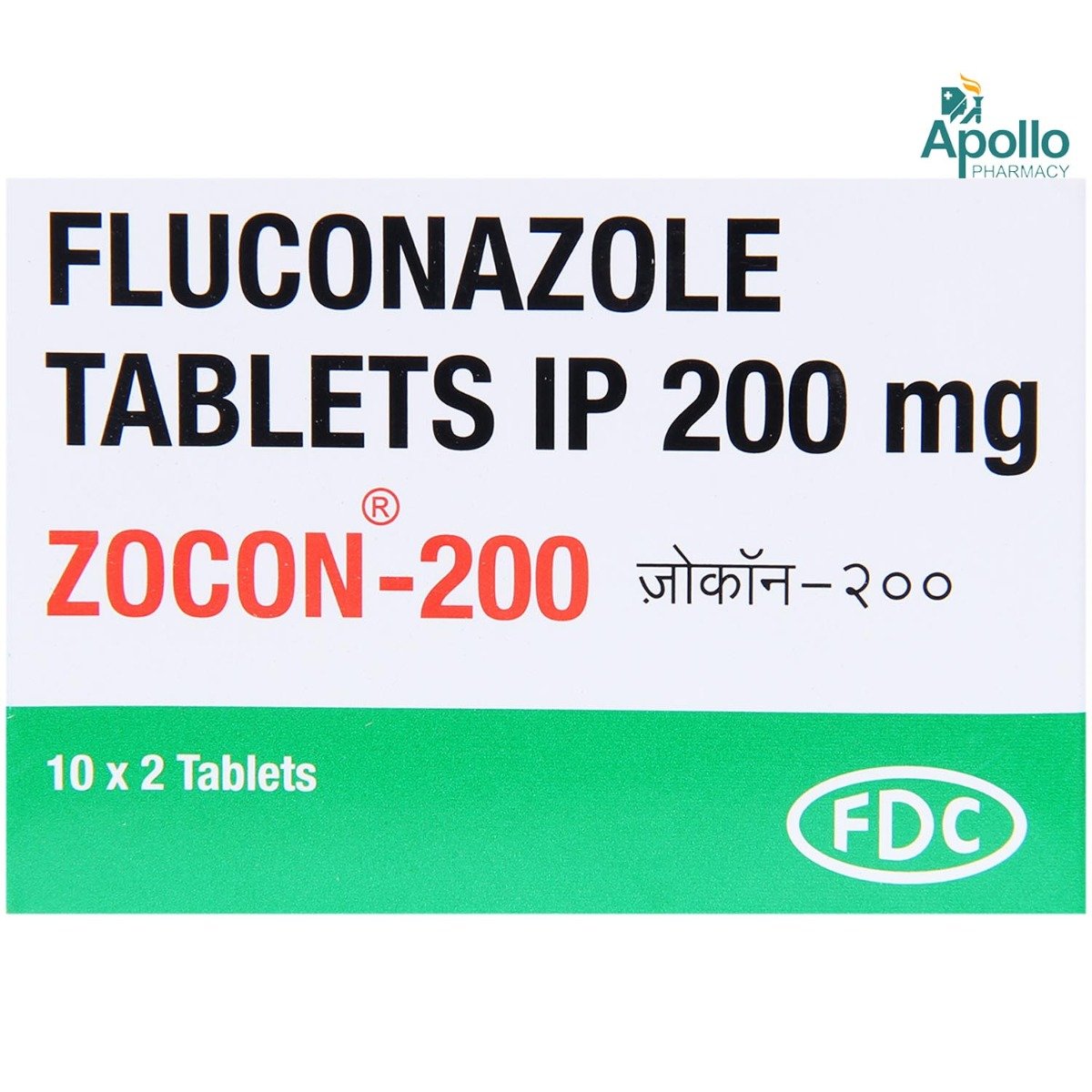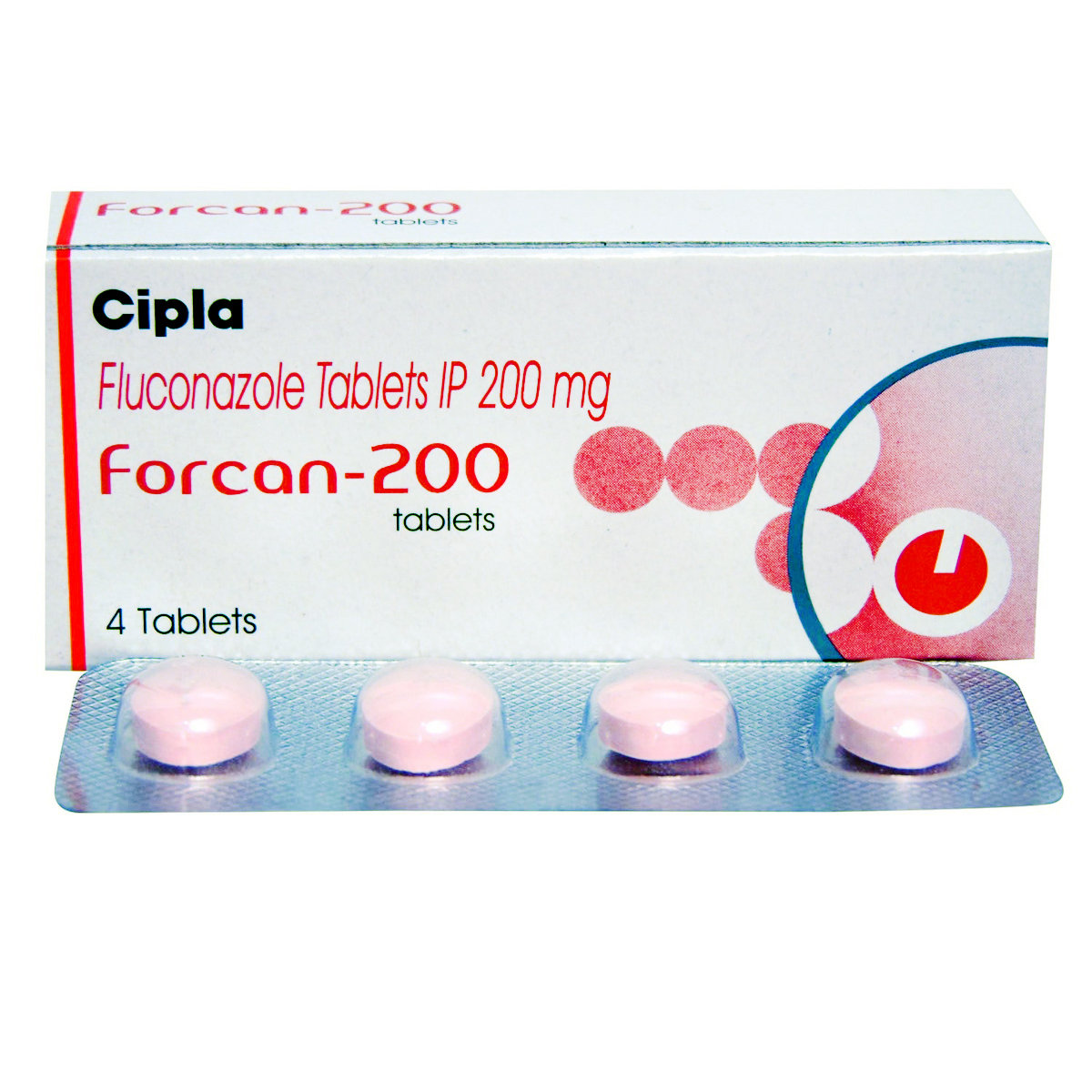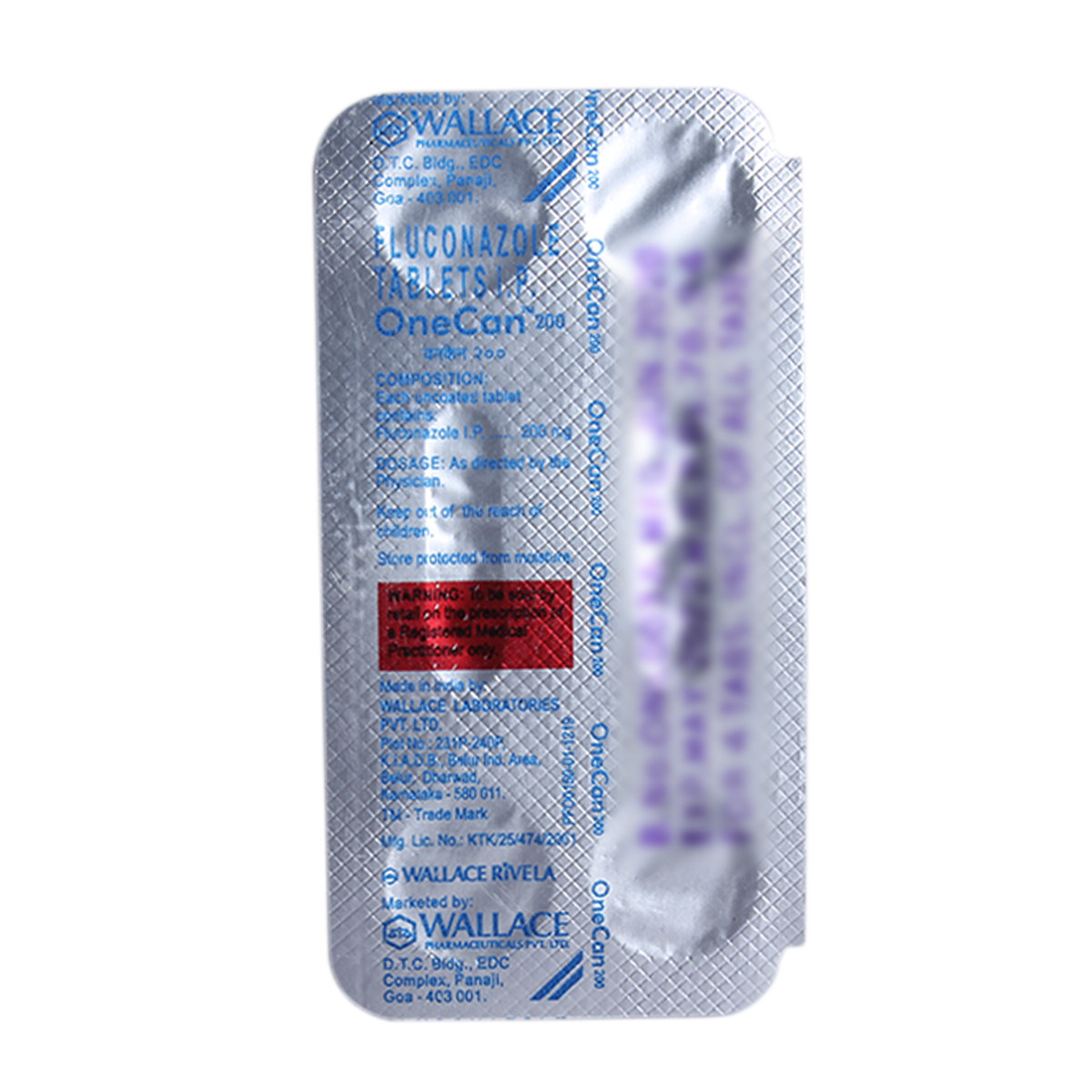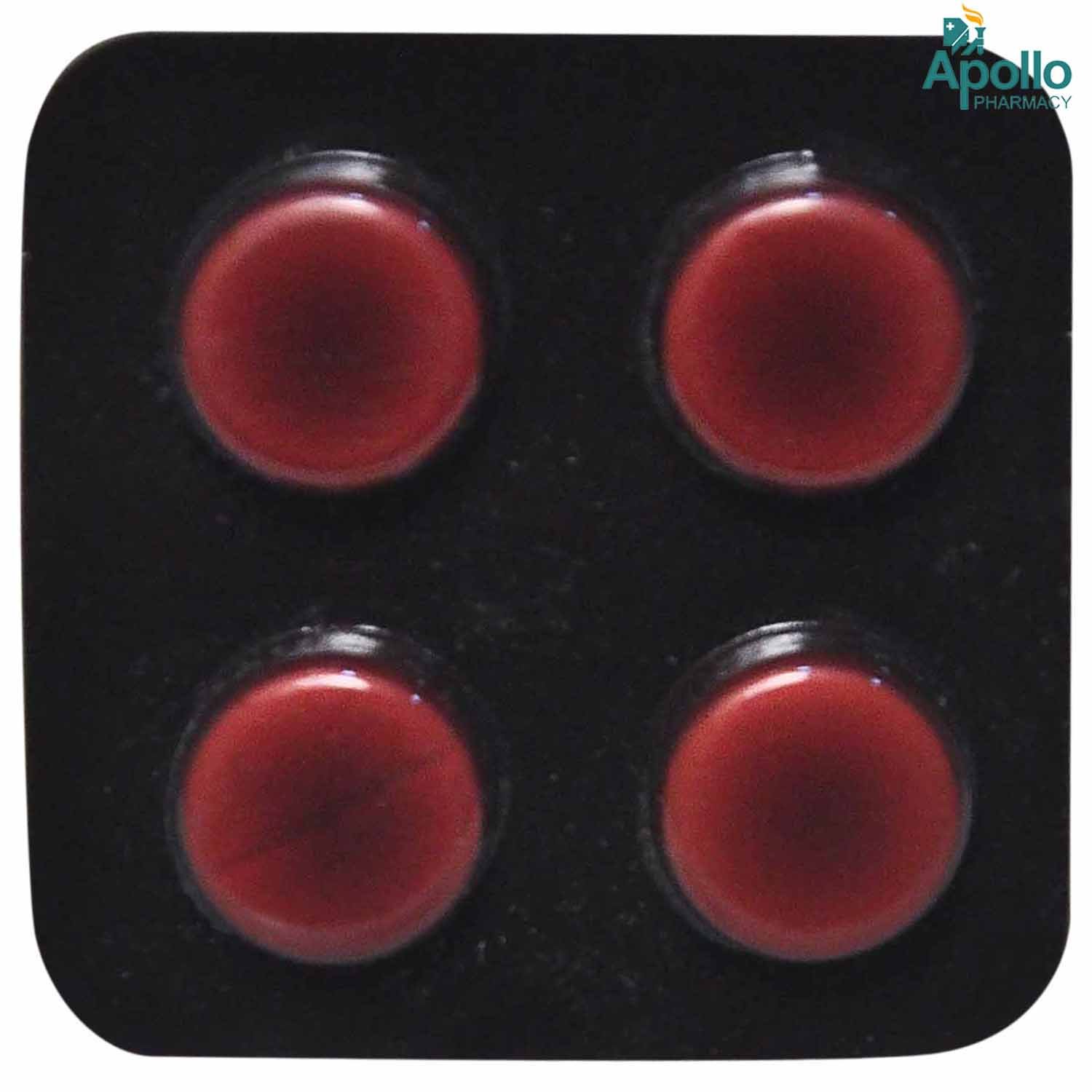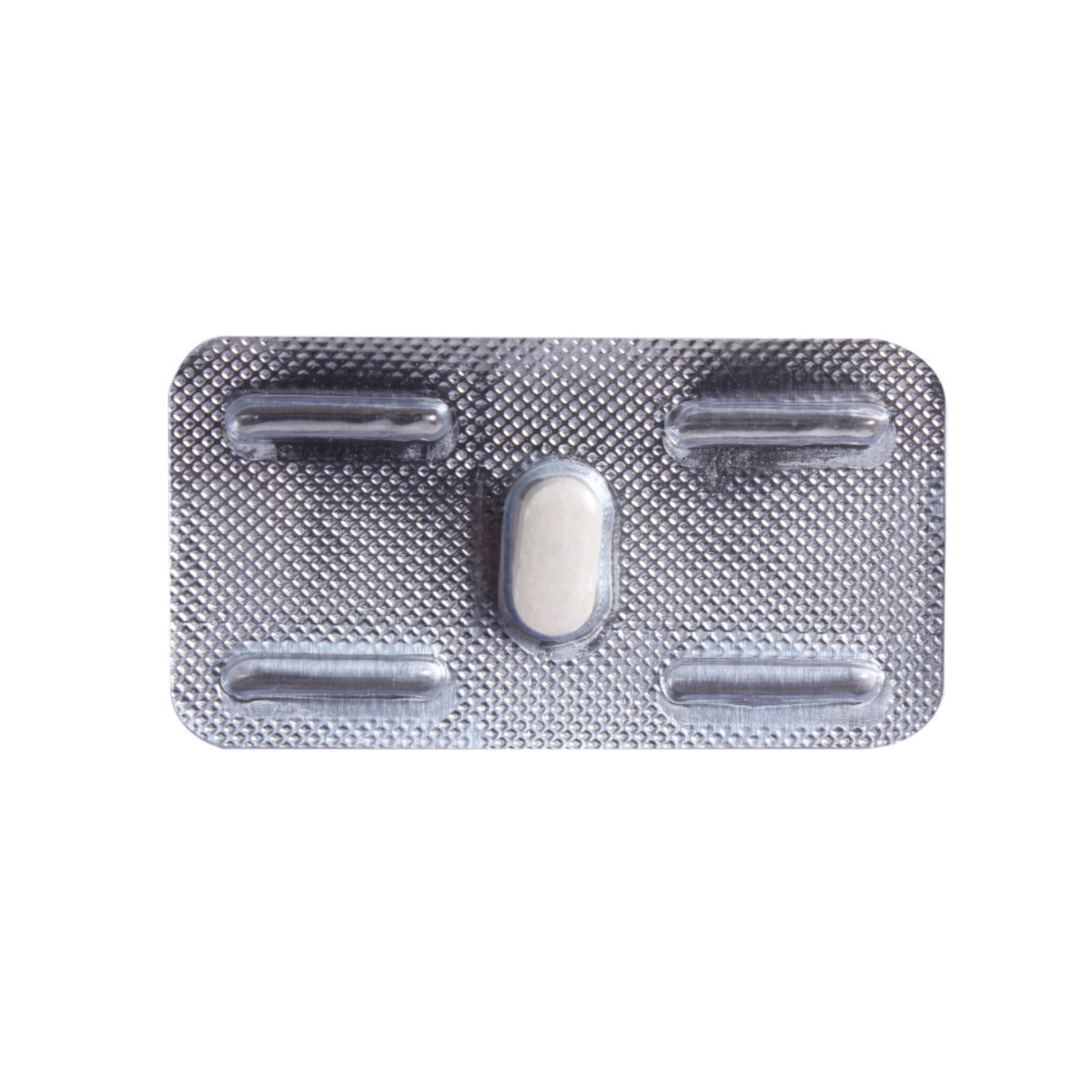Onecan 200 mg Tablet 2's
MRP ₹37
(Inclusive of all Taxes)
₹5.5 Cashback (15%)
Selected Pack Size:2
2 ₹33.3
(₹16.65 per unit)
In Stock
4 ₹67.1
(₹16.78 per unit)
In Stock
Provide Delivery Location
Online payment accepted
 Prescription drug
Prescription drugWhats That
Composition :
Manufacturer/Marketer :
Consume Type :
Expires on or after :
Return Policy :
NPPA :
About Onecan 200 Tablet
Onecan 200 Tablet belongs to the class of medicines called 'antifungals' used to treat a broad range of infections caused due to fungi and yeast. A fungal infection is caused when a fungus invades and affects any part of the body, including the mouth, throat, oesophagus, lungs, bladder, genital area, and blood.
Onecan 200 Tablet contains ‘Fluconazole’ that kills or prevents fungi or yeast by inhibiting an enzyme in fungi responsible for its normal fat metabolism, which interferes with the formation of the fungal cell membrane. As a result, fungal or yeast cells get killed or their growth is minimized.
Take this medicine as prescribed by your doctor. Onecan 200 Tablet has common side effects like headache, diarrhoea, nausea, stomach upset, dizziness, stomach pain, and altered food tastes. These side effects are not familiar to everyone and vary individually. If you notice any side effects that are not manageable, please consult your doctor.
Inform your doctor if you are allergic to Onecan 200 Tablet or any of its components. Let your doctor know if you have any liver, kidney or heart problems before starting Onecan 200 Tablet. Pregnant and breastfeeding women should consult their doctor before starting Onecan 200 Tablet. It is advised to avoid alcohol intake while using Onecan 200 Tablet to prevent any undesirable effects.
Uses of Onecan 200 Tablet
Directions for Use
Key Benefits
Onecan 200 Tablet works by killing the fungus/yeast and preventing its growth by inhibiting the fungal cell membrane formation. It is used to treat various fungal or yeast infections, such as vaginal candidiasis, oropharyngeal candidiasis (thrush, oral thrush), esophageal candidiasis (candida esophagitis), candida infections (urinary tract infections, peritonitis), and cryptococcal meningitis. Besides this, Onecan 200 Tablet is also used to prevent candidiasis and coccidioidomycosis in patients who receive cancer or radiation treatment while undergoing bone marrow transplantation. Onecan 200 Tablet is effective in treating soft tissue and pulmonary infections when compared to other azole antifungal drugs.
Storage
- Hydrate your body: Drink enough water to prevent dehydration and headaches.
- Calm Your Mind: Deep breathing and meditation can help you relax and relieve stress.
- Rest and Recharge: Sleep for 7-8 hours to reduce headache triggers.
- Take rest: lie down in a quiet, dark environment.
- Cold or warm compresses can help reduce tension.
- Stay Upright: Maintain good posture to keep symptoms from getting worse.
- To treat headaches naturally, try acupuncture or massage therapy.
- Over-the-counter pain relievers include acetaminophen and ibuprofen.
- Prescription Assistance: Speak with your doctor about more substantial drug alternatives.
- Severe Headaches: Seek emergency medical assistance for sudden, severe headaches.
- Frequent Headaches: If you get reoccurring headaches, consult your doctor.
- Headaches with Symptoms: Seek medical attention if your headaches include fever, disorientation, or weakness.
- Inform your doctor about the nausea and discuss possible alternatives to the medication or adjustments to the dosage.
- Divide your daily food intake into smaller, more frequent meals to reduce nausea.
- Opt for bland, easily digestible foods like crackers, toast, plain rice, bananas, and applesauce.
- Avoid certain foods that can trigger nausea, such as fatty, greasy, spicy, and smelly foods.
- Drink plenty of fluids, such as water, clear broth, or electrolyte-rich beverages like coconut water or sports drinks.
- Use ginger (tea, ale, or candies) to help relieve nausea.
- Get adequate rest and also avoid strenuous activities that can worsen nausea.
- Talk to your doctor about taking anti-nausea medication if your nausea is severe.
- Record when your nausea occurs, what triggers it, and what provides relief to help you identify patterns and manage your symptoms more effectively.
- Drink water or other clear fluids.
- To prevent worsening of pain, limit intake of tea, coffee, or alcohol.
- Include bland foods like rice, toast, crackers, and rice in your diet.
- Avoid lying down immediately after eating as it may cause indigestion or heartburn.
- Avoid acidic and spicy food as it may cause indigestion.
- Inform Your Doctor: Notify your doctor immediately about your diarrhoea symptoms. This allows them to adjust your medication or provide guidance on managing side effects.
- Stay Hydrated: Drink plenty of fluids to replace lost water and electrolytes. Choose water, clear broth, and electrolyte-rich drinks. Avoid carbonated or caffeinated beverages to effectively rehydrate your body.
- Follow a Bland Diet: Eat easy-to-digest foods to help firm up your stool and settle your stomach. Try incorporating bananas, rice, applesauce, toast, plain crackers, and boiled vegetables into your diet.
- Avoid Trigger Foods: Steer clear of foods that can worsen diarrhoea, such as spicy, fatty, or greasy foods, high-fibre foods, and dairy products (especially if you're lactose intolerant).
- Practice Good Hygiene: Maintain good hygiene to prevent the spread of infection. To stay healthy, wash your hands frequently, clean and disinfect surfaces regularly, and avoid exchanging personal belongings with others.
- Take Anti-Diarrheal Medications: If your doctor advises, anti-diarrheal medications such as loperamide might help manage diarrhoea symptoms. Always follow your doctor's directions.
- Keep track of your diarrhoea symptoms. If they don't get better or worse or are accompanied by severe stomach pain, blood, or dehydration signs (like extreme thirst or dark urine), seek medical help.
- Preventing Vomiting (Before it Happens)
- Take medication exactly as prescribed by your doctor. This can help minimize side effects, including vomiting.
- Having a small meal before taking your medication can help reduce nausea and vomiting.
- Talk to your doctor about taking anti-nausea medication along with your prescribed medication.
- Managing Vomiting (If it Happens)
- Try taking ginger in the form of tea, ale, or candy to help alleviate nausea and vomiting.
- What to Do if Vomiting Persists
- Consult your doctor if vomiting continues or worsens, consult the doctor for guidance on adjusting your medication or additional treatment.
- Skin rash caused by allergies is due to irritants or allergens. Therefore, avoid contact with such irritants.
- Consult your doctor for proper medication and apply an anti-itch medication. Follow the schedule and use the medication whenever needed.
- Protect your skin from extreme heat and try to apply wet compresses.
- Soak in the cool bath, which gives a soothing impact to the affected area.
- Your doctor may recommend regular liver function tests (LFT) to monitor liver enzyme levels.
- To support your liver, eat a healthy diet with lots of fruits, vegetables, lean proteins, and healthy fats.
- Avoid eating processed meats, sugary foods, and unhealthy fats.
- Limit your alcohol consumption, since too much can worsen liver function and contribute to high levels of Alkaline Phosphatase (ALP).
- Stay active with regular exercise, drink plenty of water, and try to avoid harmful chemicals that can damage your liver.
- Quit smoking to lower the risk of elevated ALP levels.
Drug Warnings
Please inform your doctor if you use any prescription, or non-prescription medicines, including vitamin and herbal supplements before using Onecan 200 Tablet. Do not use Onecan 200 Tablet if you are allergic to Onecan 200 Tablet or any of its components. Let your doctor know if you have any liver, kidney, or heart problems before starting Onecan 200 Tablet. This medicine may not be suitable for some people who have a weakened immune system, diabetes, cancer, or low blood magnesium or potassium levels; however, please seek medical advice. Pregnant or lactating women should consult the doctor before taking the Onecan 200 Tablet. Do not drive or operate machinery if you experience dizziness or other side effects that may affect your mental ability to drive. Avoid alcohol consumption along with Onecan 200 Tablet to avoid undesirable effects
Drug-Drug Interactions
Drug-Drug Interactions
Login/Sign Up
When Astemizole is taken with Onecan 200 Tablet, the body's ability to break down Astemizole may be reduced.
How to manage the interaction:
Taking Onecan 200 Tablet with Astemizole can lead to an interaction, please consult a doctor before taking it. Do not discontinue the medications without of consulting a doctor.
When Eliglustat and Onecan 200 Tablet are taken together, Onecan 200 Tablet can significantly increase the blood levels of eliglustat.
How to manage the interaction:
Taking Onecan 200 Tablet with Eliglustat together can possibly result in an interaction, but it can be taken if a doctor has advised it. However, consult a doctor immediately if you experience any symptoms such as dizziness, lightheadedness, fainting, shortness of breath, slow heart rate, weak pulse, or heart palpitations. Do not discontinue any medications without consulting a doctor.
Taking Onecan 200 Tablet with Erythromycin can increase the risk of heart rhythm problems.
How to manage the interaction:
Taking Onecan 200 Tablet with Erythromycin together can possibly result in an interaction, but it can be taken if a doctor has advised it. However, consult a doctor immediately if you experience dizziness, lightheadedness, fainting, shortness of breath, or heart palpitations. Do not discontinue any medications without consulting a doctor.
When Lomitapide is taken with Onecan 200 Tablet, may increase the blood levels of lomitapide.
How to manage the interaction:
Taking Onecan 200 Tablet with Lomitapide together can possibly result in an interaction, but it can be taken if a doctor has advised it. However, consult a doctor immediately if you experience any symptoms such as fever, chills, joint pain or swelling, unusual bleeding or bruising, skin rash, itching, loss of appetite, fatigue, nausea, vomiting, dark-colored urine, light-colored stools, and yellowing of the skin or eyes. Do not discontinue any medications without consulting a doctor.
When Tolazamide is taken with Onecan 200 Tablet, may increase the blood levels and effects of Tolazamide.
How to manage the interaction:
Although taking Tolazamide and Onecan 200 Tablet together can evidently cause an interaction, it can be taken if a doctor has suggested it. It's important to talk to a doctor about any medications you are taking to avoid any potential risks or side effects. Do not discontinue any medications without consulting a doctor.
Co-administration of Simvastatin together with Onecan 200 Tablet can increase the blood levels of Simvastatin and can increase the risk of liver damage.
How to manage the interaction:
Co-administration of Simvastatin and Onecan 200 Tablet can lead to an interaction, it can be taken if advised by a doctor. However, if you experience any symptoms like muscle pain, tenderness, weakness, fever, dark-colored urine, chills, joint pain or swelling, unusual bleeding or bruising, skin rash, itching, loss of appetite, fatigue, nausea, vomiting, and yellowing of the skin or eyes, consult the doctor immediately. Do not stop using any medications without a doctor's advice.
Onecan 200 Tablet may increase the blood levels of olaparib. This can increase the risk and/or severity of side effects such as nausea, vomiting, diarrhea, indigestion, loss of appetite, abdominal pain or discomfort, lung problems, and impaired bone marrow function resulting in low blood cell count.
How to manage the interaction:
Although there is a possible interaction, Onecan 200 Tablet can be taken with olaparib if prescribed by the doctor. Consult the doctor if you experience paleness, fatigue, dizziness, fainting, unusual bruising or bleeding, fever, chills, diarrhea, sore throat, muscle aches, shortness of breath, blood in phlegm, weight loss, red or inflamed skin, body sores, and pain or burning during urination.
Co-administration of Alfentanil and Onecan 200 Tablet may significantly increase the blood levels of ALfentanil which may increase the risk and/or severity of side effects.
How to manage the interaction:
Although there is a possible interaction between Alfentanil and Onecan 200 Tablet, you can take these medicines together if prescribed by a doctor. These symptoms include feeling very tired, having trouble breathing, feeling dizzy or lightheaded, having low blood pressure, having an irregular heartbeat, or having any other problems. Do not stop using any medications without a doctor's advice.
Taking bosutinib with Onecan 200 Tablet can increase the blood levels of bosutinib. This can increase side effects such as nausea, vomiting, abdominal pain, and diarrhea.
How to manage the interaction:
Although there is a possible interaction, Onecan 200 Tablet can be taken with Bosutinib if prescribed by the doctor. However, consult your doctor if you experience fatigue, dizziness, fainting, unusual bruising or bleeding, fever, chills, diarrhea, sore throat, muscle aches, shortness of breath, weight loss, red or inflamed skin, body sores, and pain or burning during urination. Do not discontinue any medications without consulting a doctor.
Co-administration of Hydrocodone with Onecan 200 Tablet may increase the blood levels of hydrocodone, which might increase side effects.
How to manage the interaction:
Although there is a possible interaction, Onecan 200 Tablet can be taken with Hydrocodone if prescribed by the doctor. Consult the doctor if you experience dizziness, fainting, confusion, excessive drowsiness, slow heart rate, and/or shallow or difficult breathing. Do not discontinue the medications without a doctor's advice.
Drug-Food Interactions
Drug-Food Interactions
Login/Sign Up
Diet & Lifestyle Advise
- Avoid frequent douching to maintain the natural moisture in the vagina.
- Use mild soap while taking baths and prefer warm baths.
- Avoid harsh products on your skin.
- Manage stress, eat healthily, drink plenty of water, exercise regularly, and get plenty of sleep.
- Avoid or limit the intake of alcohol and caffeine.
- It is advisable to follow a candida diet during yeast infections. This diet excludes sugar, gluten, certain dairy products, and alcohol, and includes low-sugar fruits, non-starchy vegetables, and gluten-free foods.
- A very-high sugar or high-carbohydrate diet may increase the count of Candida in some people.
Side Effects of Onecan 200 Tablet
- Headache
- Diarrhoea
- Nausea
- Stomach upset
- Dizziness
- Stomach pain
- Altered food tastes
Habit Forming
Therapeutic Class
All Substitutes & Brand Comparisons
RX
Fole 200 Tablet 1's
Unison Pharmaceuticals Pvt Ltd
₹14
(₹12.7 per unit)
23% CHEAPERRX
AF-200 Tablet 1's
Systopic Laboratories Pvt Ltd
₹15
(₹13.5 per unit)
18% CHEAPERRX
Fungicip-200mg Tablet 1's
Cipla Ltd
₹18
(₹16.2 per unit)
2% CHEAPER
Author Details
We provide you with authentic, trustworthy and relevant information
Drug-Diseases Interactions
Drug-Diseases Interactions
Login/Sign Up
Hepatotoxicity has only sometimes been linked to the usage of Onecan 200 Tablet. There have been cases of reversible idiosyncratic hepatitis, cholestasis, and deadly fulminant hepatic failure; the latter generally affects people with substantial underlying medical disorders who are also taking several concurrent drugs. Patients with pre-existing hepatic problems should have periodic liver function tests done, especially during prolonged medication. If liver enzyme levels continue to rise or worsen, treatment should be stopped.
How to manage the interaction:
In patients with preexisting liver abnormalities, particularly during prolonged therapy, liver function tests should be done regularly. Treatment should be withdrawn if persistent elevations or worsening of liver enzyme levels occur.
The QT interval on the ECG has been shown to be prolonged by some azole antifungals. During postmarketing experience, there have been a few isolated incidences of QT prolongation and torsade de pointes; these reports typically involved critically ill patients with a number of complicating risk factors, including structural cardiac disease, electrolyte problems, and concurrent medicines. Patients with illnesses that could cause proarrhythmic symptoms should take these medications cautiously. It is best to avoid using drugs that could potentially enhance the risk of cardiotoxicity concurrently.
How to manage the interaction:
It should be administered with caution to patients with heart problems. Concomitant use with other medications that have potential to increase the risk of cardiotoxicity should be avoided.
Hemodialysis effectively removes Onecan 200 Tablet from the body. Following three hours of dialysis, it has been demonstrated that plasma levels of Onecan 200 Tablet decrease by 50%. After hemodialysis, Onecan 200 Tablet should be taken.
How to manage the interaction:
Onecan 200 Tablet should be administered after hemodialysis.
FAQs
Drug-Drug Interactions Checker List
- PIMOZIDE
- QUETIAPINE
- ERYTHROMYCIN
- ERGOTAMINE
- AMIODARONE
- WARFARIN
- CARBAMAZEPINE
- LOSARTAN
- METFORMIN
- REBOXETINE
Special Advise
It is advised to reach out to your doctor if the infection symptoms persist or worsen after two weeks of treatment.
Disease/Condition Glossary
Fungal infection occurs when a fungus enters, infects, and multiplies in the body. Fungi can live in water, soil, air, and plants. Fungi affect any part of the body, including the mouth, throat, oesophagus, lungs, bladder, genital area, and blood. Mild fungal skin infections are common and can cause rashes. Fungal infections affecting body organs like the lungs can cause flu or tuberculosis. Some fungal diseases like cryptococcal meningitis and blood infections can be fatal. A few common fungal infections are yeast infections that affect the genital area, oesophagus, and urinary tract caused by the species Candida.

Have a query?
Alcohol
Safe if prescribed
It is advisable to avoid or limit the intake of alcohol while you use Onecan 200 Tablet.
Pregnancy
Consult your doctor
Please consult your doctor if you are pregnant or are planning to conceive before starting Onecan 200 Tablet.
Breast Feeding
Consult your doctor
Onecan 200 Tablet should be used with caution and only under a doctor's advice if you are a lactating mother. Please seek medical advice for more information.
Driving
Safe if prescribed
Onecan 200 Tablet may sometimes cause dizziness or other side effects that may affect your mental ability to drive. Hence do not drive or operate machinery if you are not mentally alert.
Liver
Consult your doctor
Let your doctor know if you have any history of liver diseases when you are prescribed Onecan 200 Tablet.
Kidney
Consult your doctor
Let your doctor know if you have any history of kidney diseases when you are prescribed Onecan 200 Tablet.
Children
Safe if prescribed
Onecan 200 Tablet may be prescribed to children by the doctor, depending on the infection. The doctor decides the right dose for a child based on his/her age and weight.

